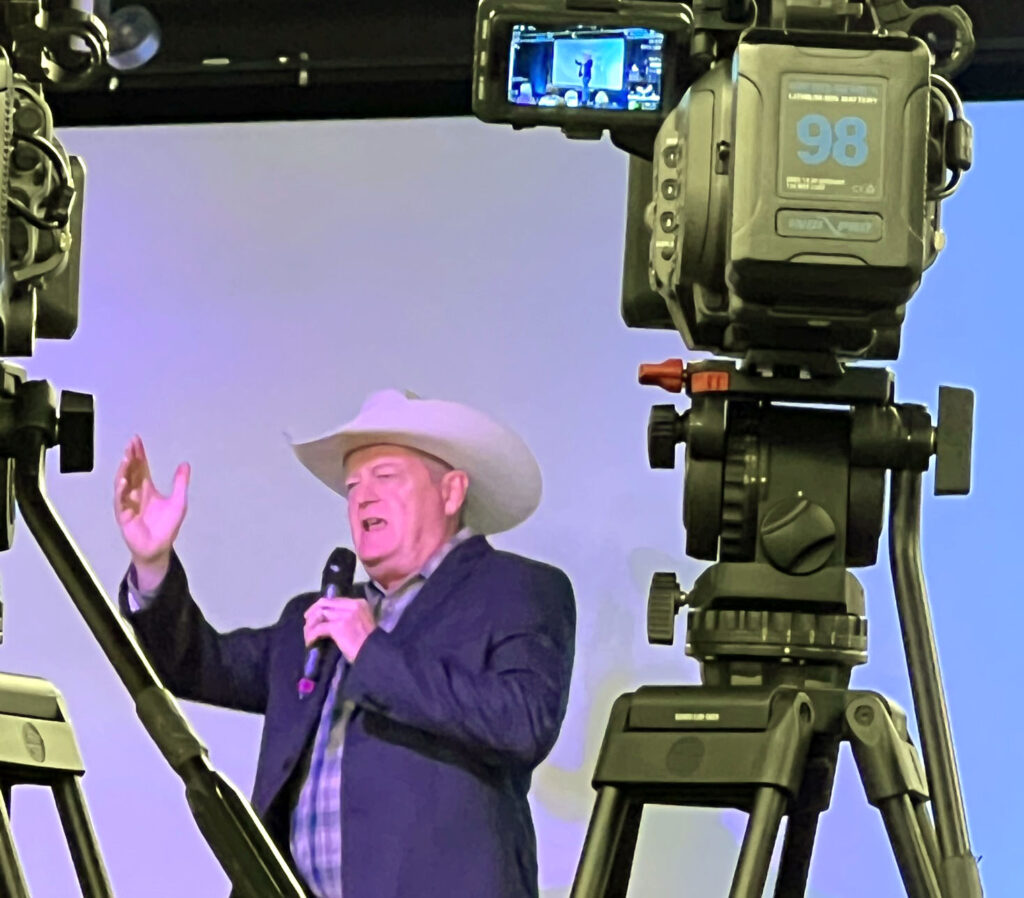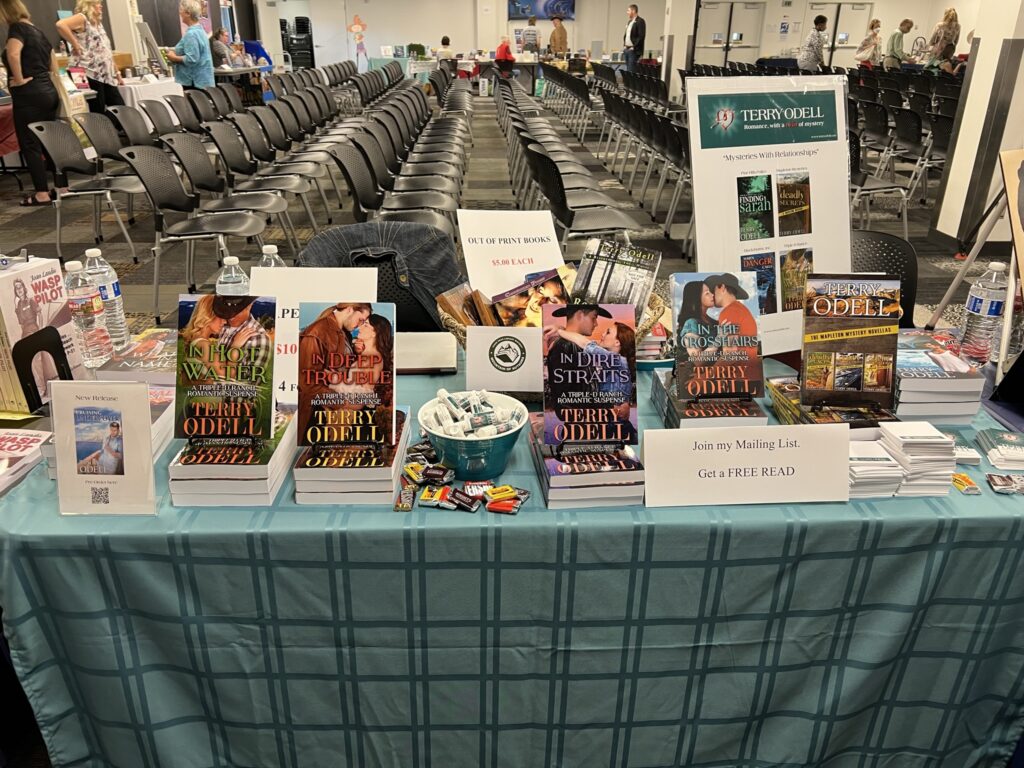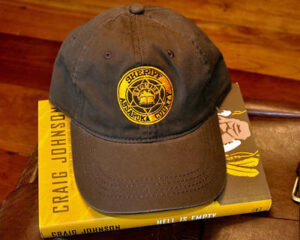Library Events, Longmire, and Craig Johnson
Terry Odell
 ***UPDATED to add the link to Johnson’s presentation. Note: His presentation begins at about the 6 minute mark.
***UPDATED to add the link to Johnson’s presentation. Note: His presentation begins at about the 6 minute mark.
I had the pleasure of attending a local library event where Craig Johnson was the invited keynote speaker. I’d heard him speak before, and he’s got a great sense of humor, so I knew his talk would be entertaining. His talk was paired with an “Author Showcase” where 30+ authors, writing in a multitude of genres, were given tables to display their wares. I was fortunate to be accepted.
I’ve done this event before. The structure of this year’s event was different from its predecessors. Previously, there were several “writing-related” panels, separated by breaks where attendees were encouraged to wander the room and look at the authors’ wares. The final presentation was the keynote address, and attendance jumped as “normal readers” came for just that, but there were people at the venue throughout the schedule.
 My experience this year. YMMV. This was an event focused on a well-known author. It’s not a craft workshop by any means. The majority of attendees are coming to hear Johnson speak, not buy books. Overall, most people who come to library events aren’t coming to buy books, unless, of course, you’re the keynote speaker, in which case you’ll probably sell a lot of books. Johnson also had a table full of Longmire-related merchandise.
My experience this year. YMMV. This was an event focused on a well-known author. It’s not a craft workshop by any means. The majority of attendees are coming to hear Johnson speak, not buy books. Overall, most people who come to library events aren’t coming to buy books, unless, of course, you’re the keynote speaker, in which case you’ll probably sell a lot of books. Johnson also had a table full of Longmire-related merchandise.
This year, there were no panels. The authors were invited to show up about 2 hours early to set up, have lunch, and a chance to interact with Johnson. The doors were scheduled to open to the public an hour before Johnson was scheduled to speak, during which time attendees were free to roam the showcase tables. Very few did. They were there to listen to Craig Johnson, evidenced by the fact that when the library decided to open doors to the public ahead of their announced time, the ‘early birds’ filed in and found seats even though they had almost two hours to wait. Very few wandered the outskirts of the room where the authors had their tables. At the advertised “doors open at” time, a lot more people filed in and headed straight to Johnson’s table.
Johnson began his talk by saying he comes from a small town of 25 people. He was a rancher, and he still is. He spoke of wanting to become a writer. At the time, noir was the big thing, but he didn’t want that, so he came up with the idea of a small town sheriff. He wrote and rewrote the first few chapters of his manuscript. It was bad, and he knew it. He realized if he was going to write about a small town sheriff, he needed to know more about what the job entailed, so he visited the local sheriff who was willing to speak with him. They chatted for a short while, and Johnson was convinced he now had the answers and was going to write the book and become famous. So much so, that he remodeled his house, updated his ranch structures, and worked on renovating a store for his wife.
When he opened his bottom desk drawer one day (looking for something else, of course), and saw the manuscript, he realized ten years had passed. He happened to run into the sheriff at the gas station one day shortly thereafter and re-introduced himself as the man who’d come to the sheriff for advice for a book. The sheriff’s response was, “This book’s going kind of slow.”
Johnson went home and reworked the first chapter and, late one night, went against his instincts and sent it to the sheriff. Early the next morning, in the ‘quiet time’ while Johnson was on his front porch having his coffee, the sheriff sped down the ranch road and skidded to a stop, got out of his vehicle, and said, “I know who did it!”
He was wrong. In fact, Johnson sent him chapters as he wrote them, and the sheriff was wrong every time.
Johnson went on to talk about the Longmire series. When the producers wanted his input for casting Walt Longmire, Johnson had no idea. All the actors he though would be good for the part were long dead; he wasn’t up to speed on the younger ones. There were two issues to consider: whether to go with a popular actor or an unknown. The popular cowboy-hat-wearing actors, according to Johnson, were a small handful, and people would associate them with previous roles. However, Walt Longmire was supposed to be in his 50s, and unknown actors in that age range were probably unknown because they weren’t very good. The studio sent Johnson a box of CDs with all the auditions for the role, and he begrudgingly, but dutifully watched them. The audition scene was a ‘death notification’ which is one of the most dreaded jobs for law enforcement.
As Johnson told it, he got to the last CD, not having been impressed yet. He saw the actor’s name: Robert Taylor, and his first thought was “They took my advice.” Only the over-30s in the audience got that joke. At any rate, in the audition, when Taylor went to deliver the death notification, he removed his hat and put it over his heart. That gesture—and a comment by Johnson’s wife as she was watching (Oh, my!—and not for the gesture) got Taylor the job.
A member of the audience asked how Johnson and the writers got along. Johnson declined to be in the writer’s room, but asked the scripts be sent to him, and they’d discuss points Johnson disagreed with, usually explaining their rationale. One in particular, was that they wanted to make the main characters 10 years younger. Johnson objected, but their explanation was, “We want this to be a long-running series and can’t have the major players using walkers.”
Johnson spoke of his first invitation to a library event, where the librarian said they were a very small county and didn’t have much to offer in the way of an honorarium. Johnson (after looking up what an honorarium was), said he didn’t like to negotiate, so he’d ask for the same he asked of all libraries. A six-pack of Rainier beer.
Years later, he was invited to another event where the librarian handed him his honorarium, which, due to the rules against alcohol in the building, was wrapped in brown paper, taped, and tied with string. Johnson commented that it looked more like heroin than beer. At any rate, the librarian said it had been hard to procure the beer, and Johnson said he understood that most bars didn’t serve the “cheap stuff.” She said, no, that wasn’t it. Everyone was out of stock, including the brewery. Johnson called the brewery the next day, and was told that yes, the librarian was right. They had run out. Why the shortage? This was two weeks after Longmire hit the screens, and everyone was drinking Walt’s favorite brew.
 Other “issues” for being an author with a popular television series as related by Johnson. He was paying for lunch at a café on a road trip. He was wearing one of his ball caps that said “Sheriff, Absaroka County, Wyoming” and the clerk questioned it. Johnson said he wasn’t really the sheriff, and it wasn’t a real county. She came back with “It is, too. That’s Walt Longmire’s County.” He introduced himself and she said, “Huh?” He said he wrote the books the series was based on. She said, “There are books?”
Other “issues” for being an author with a popular television series as related by Johnson. He was paying for lunch at a café on a road trip. He was wearing one of his ball caps that said “Sheriff, Absaroka County, Wyoming” and the clerk questioned it. Johnson said he wasn’t really the sheriff, and it wasn’t a real county. She came back with “It is, too. That’s Walt Longmire’s County.” He introduced himself and she said, “Huh?” He said he wrote the books the series was based on. She said, “There are books?”
One of the best takeaways for me was in response to a question about the differences in books versus the visual media. He said books have one big advantage—the author sets up words like dominoes, and the first sentences tips the first tile, and they tumble along, propelled by the reader’s imagination.
Other takeaways from the event, on the extremely rare chance someone would invite me to give this kind of a talk:
- Open with a VERY short background sentence or two.
- Talk a little bit about how you began writing. Make it a story, not a recitation of events.
- Talk a little bit about the life of a writer and experiences you’ve had. Johnson spoke of being able to donate generously to his favorite charity.
- Read a little bit of one of your works. In this presentation, Johnson spoke of going to a high school girls’ basketball game with the father of one of the players. What he saw there led to a scene in one of his books, and he followed that story by reading it.
All right, TKZers. If you were invited to give a non-craft presentation to readers (or viewers), what would you talk about?
 Now Available for Pre-Order: Cruising Undercover.
Now Available for Pre-Order: Cruising Undercover.
Not accepting the assignment could cost him his job. Accepting it could cost him his life.
 Terry Odell is an award-winning author of Mystery and Romantic Suspense, although she prefers to think of them all as “Mysteries with Relationships.”
Terry Odell is an award-winning author of Mystery and Romantic Suspense, although she prefers to think of them all as “Mysteries with Relationships.”

Thanks so much for this, Terry. I felt as if I were in the room. I don’t know if your note-taking skills have degenerated, but your narrative skills are razor sharp.
If asked to give a non-craft presentation, I would introduce myself as a boring guy who has had a very interesting life, briefly describe my low and high points, and talk about where I get my ideas. Folks are going to ask anyway.
Hope you’re having a great week, Terry!
Thanks, Joe.
Ah, yes, the “where do you get your ideas?” question. I get mine from the idea tree in the yard.
I was introduced to Longmire by an indigenous friend of mine when I asked for help with a book I was writing that included indigenous people. She said Craig Johnson nailed it, and even directed me to a couple of the Longmire episodes to check out. Once I started watching, I was hooked.
Thanks, Karla. One thing Johnson mentioned was trying to be realistic when portraying the indigenous people. One comment he made was that when he reads/watches anything set in Wyoming, he always asks, “Where are the Indians?” (his words.) He had more to say about that in his talk, both humorous and serious.
Thanks, Terry. This was a wonderful post, especially for those of us who are beginning the public speaking route of marketing. Your notes were very helpful. I look forward to watching the recording of Johnson’s presentation. And I am bookmarking this post for future reference.
If I were invited to give a non-craft presentation to readers, I would talk about “Leaving a Legacy.”
Thanks again, and have a wonderful day.
Thanks, Steve. I’d go/listen/stream your talk for sure.
I’d talk about L.A. There’s an endless supply of stories out of the greatest noir city in the world. Like this one.
I lived the first quarter century of my life in LA, and have to agree with you on the story fodder. Thanks for sharing the link.
About 1945, a woman was murdered late at night on the street below our house in the Baldwin Hills. My mother was a witness for the prosecution. She had been up with a neuritis attack, unable to sleep, and heard the shots. She met Detective Sergeant Ray Hopkinson before and during the trial.
Ah, Longmire, probably the best series ever. If they decide to do a “Longmire:Early Years” Robert Taylor’s fellow countryman, Aaron Jeffery, could play the part.
Terry, thanks for this post. I could have used the advice for my first book club appearance. I had no idea what they were expecting, so I rambled with some things I shouldn’t have. It wasn’t too bad, I guess, because they ran out of the case of books they had on hand, but I cringe when I remember it. If I’m ever in that position again, I’ll read your post and be prepared.
Thanks, Becky. I was surprised to learn that Robert Taylor was an Aussie. Not a hint (that I could hear) in his “accent.”
Congrats on selling out – I’m sure you were much better than you thought you were.
Terry, like Joe, I felt as if I were sitting beside you listening. Great summation. Eager to hear the link, too.
My experience with library events is limited but similar to what you relate–libarary readers tend to be borrowers rather than buyers.
I have several in-person author appearances this summer so I need to think on your question of what to talk about. Thanks for the nudge!
Thanks, Debbie. Always glad to share what I’ve learned/experienced, and always glad to know others have enjoyed my ramblings.
My anecdotal experience as a librarian very much aligns with you and Terry about library patrons, as well as library staff, are typically not book buyers, unless it’s a book that they can’t get at their library and really want, or a beloved book that they want to own. I was (and am) a weird outlier in that I bought and still buy a lot of books. I like having my own library 🙂
Yes, I’ve attended 3 Author Day events at our local library. IIRR, I’ve sold a grand total of 0 books. Nothing grand about it.
My anecdotal experience as a librarian very much aligns with you and Terry about library patrons, as well as library staff. They typically are not book buyers, unless it’s a book that they can’t get at their library and really want, or a beloved book that they want to own. I was (and am) a weird outlier in that I bought and still buy a lot of books. I like having my own library 🙂
Dang it–sorry about the double post–I caught a goof before I thought the first attempt had posted.
Terrific write-up of Terry. I really enjoyed reading about Craig Johnson’s presentation and his experiences as an author, as well as of course the various bits about the library and librarians 🙂
If I were ever asked to give a talk about a non-craft topic to readers or viewers, I’d probably stay on brand and talk about library stories, not the buildings or the procedures, but the people, the patrons, the volunteers, and staff and all the various stories around working in a library. Would have enough anecdotes to fill several presentations.
Thanks for sharing this! Have a wonderful Wednesday.
Thanks, Dale, and I’ll bet libraries have as many stories hiding in the stacks as JSB’s Los Angeles tales.
Jim is right. Los Angeles is without equal as a source of noir and crime stories. Ever since I read Red Wind and thought about the Santa Anas and The Day Of The Locust I was hooked. I lived in Long Beach and Signal Hill for thirteen years in two separate platefuls and I have to say it is unparalleled. The only place I can think of that might even come close is Kingston, Jamaica.
Thanks to my subscription to the Los Angeles Times I can watch a lot of it. Here in Iowa for the most part we have to invent people doing bad things. I often think that things being what they are living in a place where nothing much happens is not the worst thing in the world.
I also live in Iowa, and heartily agree. I have a despicable character in one of my books, and because I know Des Moines so well, the story should take place here, but I simply cannot imagine that level of evil corruption anywhere around me. I am thankful for this.
I live in Windsor Heights just west of 63d. You name the place and I’ll buy the coffee.
West Des Moines 🙂
McDonald’s at 63rd & Grand?
Right down the street. Tomorrow at noon. Old guy, black tee shirt, ball cap with Guild on it.
I grew up in LA. My mom still lives there, and I try to get out to visit when conditions permit. I left in my early 20s, so didn’t appreciate anything other than my school friends. Where we lived, it was wildfires and the subsequent flooding that were my biggest “concerns.”
Thanks, Terry. Like others, I felt like I was in the room with you. And those are great tips for giving a talk that keeps the audience engaged.
If I had to give a presentation, what would I talk about? That would depend on the audience and which book I was talking about. If it was my last book that featured two young girls who fancied themselves Nancy Drew wannabes, I’d talk about my childhood and spending most of my weekends with my cousins on the Georgia farm of my Great Aunt Irene and Great Uncle Fred. It might include being sandwiched in between two of my cousins atop Old Dan, the giant gelding whose response to our shouts of “GiddyUp” was to plod patiently along the path around the pond. It was a time of building lifelong relationships while running barefoot races on dirt roads and climbing trees. I would probably focus on all the antics young children get into and the joy of that time of life. (Except for the snakes, of course.)
Kay, great memories. I’m sure an audience would be fascinated. (I’d suggest not limiting your talk to one book, though. Talk about your series.)
Figure out the audience, and you’ll usually know the topic. And pick a topic you are passionate about. If all else fails, open it up to questions.
It’s very, very rare for an author to have that much impute into a TV series or movie. My local science fiction convention managed to get Jim Butcher as the guest of honor. They invited him just before his books exploded up the bestseller charts, and THE DRESDEN FILES TV show was a few episodes in when he came. The TV producers asked him questions, but they rarely used his answers. Some of the changes were practical. A man the size of Dresden won’t really fit into a Volkswagen Beetle. And Paul Blackthorne wasn’t even as tall as he was. Some changes were stupid. His wizard’s staff was a hockey stick because of some new backstory the producers thought up then dropped. And hiring a classical trained actor to play Bob the talking skull was cheaper than the CGI. I really enjoyed that show. A pity it didn’t run more than one season.
Johnson’s comments about being involved in the series had him likening it to hiring help to run his ranch. You get the best people you can find, then do the hardest job of all–let them do their jobs.
I know CJ Box had optioned the Pickett series for years, and he was never satisfied, and/or they didn’t want to pick it up. He said he was fine with cashing the checks they sent to keep their option.
I don’t have any of the particulars on his current series, but they started with his non-Pickett series.
Love this, Terry! Longmire was one of our favorite shows. Like Joe said, I felt like I was in the room with Craig Johnson. Your note-taking skills are top-notch. Thank you!
Dark Winds based on Tony Hillerman’s novels is equally excellent.
Glad you enjoyed it, Sue. I’ll have to nudge the library about the replay.
Longmire was wonderful. A great cast. We loved all the actors, even the villains! The show had heart.
For a non-craft presentation: As you may have noticed, I’m passionate about psychology: what makes people, real or imagined, tick. My cerebral dualism hypothesis posits a second, intuitive autonomous mind within the brain, congruent with the limbic system and associated areas, and faster than the frontal-cortex-based intellect. This hypothesis explains many well-known brain phenomena: hypnic jerks, alcoholic relapse, sleep-walking, “Life Reviews,” “Terminal Lucidity,” déjà vu, hypnosis, alcoholic blackouts, road rage, insomnia, highway hypnosis, bipolar disorder, Freudian slips, and others. I’m hopeful that studies based on this hypothesis may reveal clinical techniques useful in treating addiction and other problems.
A fascinating “hobby”- and the potential for presentation topics is endless.